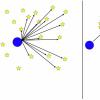According to a relatively recent paper, some of the action of Glucosamine appear to be driven by protecting the integrity of Mitochondria:
“Glucosamine inhibits IL-1β expression by preserving mitochondrial integrity and disrupting assembly of the NLRP3 inflammasome” (2019)
https://www.ncbi.nlm...les/PMC6447579/
This is of course compatible with the previous assertion, based on circumstantial evidence:
- glucosamine induced autophagic vesicles have a larger volume than in fasting-induced autophagy (so either more, or larger cell components get recycled)
- glucosamine has a strong anti-cancer effect – according to the (not yet fully accepted) Warburg effect most cancers are partially driven by mutant mitochondria (either causal for DNA mutations, or as a necessary condition for cancer progression after DNA damage occurred)
This alone wouldn’t necessarily be suprising – it’s simple Mitophagy. However, the authors note some very peculiar mitochondrial effects of glucosamine, that almost sound contradictory to previous research.
According to the mice-lifespan study in 2014, it was theorized, that GS causes its effect through “mitohormesis” - meaning it increases mitochondrial reactive oxygen species (ROS) production, due to some kind of shift away from glucose metabolism. As a response, shortly afterwards the cell activates stress-response mechanisms that are pro-life extension in the long run.
This current study instead performs in-vitro experiments indicating, that GS reduces ROS-production in mitochondria. Now this is not the first study, that ascribes an anti-oxidant mechanism to GS; see this study in mice:
“
Glucosamine attenuates cigarette smoke-induced lung inflammation by inhibiting ROS-sensitive inflammatory signaling.” (2014)
https://www.ncbi.nlm.nih.gov/pubmed/24486342
The authors acknowledge, that the reduction in ROS may be due to increased autophagy. Though in this study they also try to demonstrate the biochemical basis for a none-AP effect. Quote:
“Interestingly, GlcN alone increased the DiOC2(3) staining compared to the control cells, indicating that GlcN increased mitochondrial function (Fig. 3C). Furthermore, ATP treatment induced mitochondrial ROS production (Fig. 3D), leading to NLRP3 inflammasome assembly24. We found that ATP-mediated mitochondrial ROS production was reduced by GlcN treatment in J774 A.1 macrophages (Fig. 3D). These results demonstrated that GlcN inhibited NLRP3 inflammasome activation by reducing mitochondrial integrity loss.”
Note: GS is not neutralising ROS. It prevents ROS-production in the first place. I personally wouldn’t be sure, if that still isn’t AP-mediated. But the exposure time of just 4 hours to ROS/inflammation causing agents, and the reduction in inflammatory molecule-levels by 50%-70% due to GS in that time span, would indicate a really rapid AP-turnover of mitochondria – if AP is the driving factor. I’m not an AP-expert. So: is the recycling of the majority of a cells mitochondria in just 4 hours plausible?
If not the authors might be correct in concluding an additional ROS-reducing effect of GS. And that is at least superficially at odds with the assumption of “mitohormesis” in the 2014 mice-lifespan-study (i.e. increased ROS-production).
Though I find the idea of the life-span study, that the life-extension effect might be due to mimicing a low-carb-diet not very convincing on other grounds. If that is true, a true low-carb/keto-diet should exert similar cellular responses as GS. But injecting mice with the people-equivalent of 3 g of GS leads to a much stronger AP-response than even prolonged fasting (in turn presumily even more AP-inducing than a keto-diet).
my conclusion:
a) either GS is causing really strong mitophagy (like: really, really)
b) and/or it’s effects definitely are not based on mimicking a keto-diet
All this of course demonstrates, that even small changes in molecules can have drastical functional differences. GS is almost identical to glucose, execpt for one amino-group. It’s a really simple bio-molecule (much simpler than rapamycin). Though it seems to be a strong AP-promoter and strongly preventing (accumulation of) damaged mitochondria. As a consequence it’s the probably best cancer-prevention supplement for which there is evidence available in mice and men (albeit no RCT in humans, but cohort studies).



































































